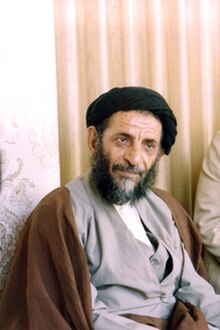Abbas Almohri
This article needs additional citations for verification. (July 2019) |
This article may rely excessively on sources too closely associated with the subject, potentially preventing the article from being verifiable and neutral. (July 2014) |
Abbas Almohri | |
|---|---|
 Ayatollah Sayed Abbas Almohri | |
| Title | Ayatollah |
| Personal | |
| Born | 1915 |
| Died | 15/2/1988 |
| Religion | Islam |
| Nationality | Kuwait |
| Region | Kuwait, Iran, Iraq |
| Jurisprudence | Shia Islam |
| Creed | Shia Islam |
| Main interest(s) | jurisprudence, politics |
| Notable work(s) | A radius of the History (شعاع من التاريخ), Ayatollah Montazeri's teaching reports (Never published) |
| Muslim leader | |
Influenced by | |
Ayatollah Sayyed Abbas Almohri (Arabic: آية الله سيد عباس المهري; 1915–1988) was one of the first Kuwaiti Shia scholars based in Kuwait. He was born in Iran in the province of Fars. He studied religion in Najaf and then he went to Kuwait to help people learn more about their religion and specifically the creed of Shia.
He helped Ayatollah Khomeini in his revolution against the Shah of Iran. Later he started a political reformist movement in his country. Within a few months of the Islamic Revolution, in 1979, he was forced to leave Kuwait with his family[1] as the authorities sought to prevent an Islamic Revolution in the state (Ghabra, S.N. 1995).
Abbas Almohri's family members are Kuwaiti nationals.[2] His eldest son Ayatollah Sayyed Mohammad Almohri was one of the most respected scholars in Kuwait. He was Imam of Shaban mosque (after his father) in Sharq, Kuwait. His younger son Ayatollah Sayyed Mortadha Almohri is a known former jurisprudence student of Ayatollah Sistani.[3][4]
Notes
- ^ "KUNA :: Today in Kuwait's History :: 26/09/2008". Kuna.net.kw.
- ^ [1]
- ^ "Archived copy". Archived from the original on 2014-03-05. Retrieved 2014-02-17.
{{cite web}}: CS1 maint: archived copy as title (link) - ^ "السيرة الذاتية - موقع مكتب سماحة المرجع الديني الأعلى السيد علي الحسيني السيستاني (دام ظله)". Sistani.org.
References
- موقع سماحة العلامة المرحوم السيد عباس المهري
- Ghabra, S.N. (1995), Kuwait: A Study in the diametrical state, authority and community mechanisms.
